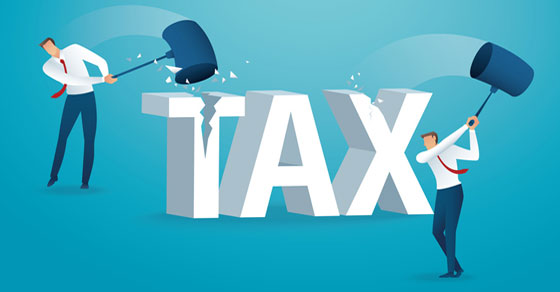6 key IT questions to ask in the new normal
- ByPolk & Associates
- Jul, 08, 2020
- All News & Information, COVID-19 Resources
- Comments Off on 6 key IT questions to ask in the new normal
The sudden shutdown of the economy in March because of COVID-19 forced many businesses to rely more heavily on technology. To keep your IT strategy relevant in the new normal, you’ve got to reassess processes and assets by asking the right questions. What are your users saying about your company’s technology? Do you have “information silos” inhibiting collaboration between people or teams? Do you have a sound digital file-sharing policy? Has your technology become outdated by the rapid, crisis-driven changes? Is more training needed? Are your security protocols being followed? Our firm can help you assess your IT strategy and identify cost-effective process changes and asset upgrades.
After you file your tax return: 3 issues to consider
- ByPolk & Associates
- Jul, 08, 2020
- All News & Information, COVID-19 Resources
- Comments Off on After you file your tax return: 3 issues to consider
After filing a 2019 tax return, there may still be three issues to bear in mind. 1) You can check up on your refund. Go to irs.gov and click on “Get Your Refund Status” to find out. 2) Some tax records can now be thrown out. You should generally save statements, receipts, etc. for three years after filing (although keep the actual returns indefinitely). But there are exceptions to this general rule. 3) If you forgot something, you can generally file an amended tax return. File Form 1040X to claim a refund within three years after the date you filed the original return or two years of the date you paid the tax, whichever is later. Contact us for more information.
Steer clear of the Trust Fund Recovery Penalty
- ByPolk & Associates
- Jul, 08, 2020
- All News & Information
- Comments Off on Steer clear of the Trust Fund Recovery Penalty
If you own or manage a business with employees, you may be at risk for a severe tax penalty. It’s called the “Trust Fund Recovery Penalty” because it applies to the Social Security and income taxes required to be withheld by a business from employees’ wages. Because the taxes are considered government property, the employer holds them in “trust” on the government’s behalf until they’re paid over. The penalty is also sometimes called the “100% penalty” because the person liable and responsible for the taxes will be penalized 100% of the taxes due. Accordingly, the amounts IRS seeks when the penalty is applied are usually substantial, and IRS is very aggressive in enforcing this penalty.
Assessing productivity as you cope with the pandemic
- ByPolk & Associates
- Jul, 02, 2020
- All News & Information, COVID-19 Resources
- Comments Off on Assessing productivity as you cope with the pandemic
The COVID-19 crisis is affecting not only the way many businesses operate, but also how they assess productivity. With many employees working remotely, some company leaders initially worried about productivity. But a poll conducted in part by USA Today in April found 54% of respondents said that working remotely has positively affected their productivity. You should be able to count on remote workers to fulfill their job duties. However, business owners also must recognize the work-life balance and mental health challenges of working during a pandemic. You can also use metrics such as revenue per employee to measure the financial impact of productivity. Contact us for more info.
Some people are required to return Economic Impact Payments that were sent erroneously
- ByPolk & Associates
- Jul, 02, 2020
- All News & Information, COVID-19 Resources
- Comments Off on Some people are required to return Economic Impact Payments that were sent erroneously
Economic Impact Payments (EIPs) are being sent to eligible individuals in response to the financial impact caused by COVID-19. However, the IRS says some payments were sent erroneously and should be returned. For example, an EIP made to someone who died before receipt of the payment should be returned. The entire EIP should be returned unless it was made to joint filers and one spouse hadn’t died before receipt. In that case, you only need to return the EIP portion made to the decedent. This amount is $1,200 unless your adjusted gross income exceeded $150,000. Instructions for returning the payment can be found here: https://bit.ly/31ioZ8W.
Haven’t filed your 2019 business tax return yet? There may be ways to chip away at your bill
- ByPolk & Associates
- Jul, 02, 2020
- All News & Information
- Comments Off on Haven’t filed your 2019 business tax return yet? There may be ways to chip away at your bill
The extended federal income tax deadline is approaching. The IRS postponed until July 15 many payment and filing deadlines. The CARES Act, which passed in 2020, includes some retroactive tax relief for businesses. Some provisions may affect a still-unfiled tax return or you may be able to take advantage of them on an amended return. For example, net operating losses (NOLs) that arise in tax years 2018 through 2020 can be carried back 5 years. So an NOL reported on an unfiled return may be carried back to an earlier year and allow you to recover tax paid in the carry-back year. Because tax rates were generally higher in years before 2018, NOLs carried back to those years can be beneficial.
Launching a business? How to treat start-up expenses on your tax return
- ByPolk & Associates
- Jun, 26, 2020
- All News & Information
- Comments Off on Launching a business? How to treat start-up expenses on your tax return
While the COVID-19 crisis has devastated many businesses, the pandemic has also created opportunities to launch new businesses. For example, some businesses are being started online to provide products and services to people staying at home. Entrepreneurs often don’t know that many start-up expenses can’t be currently deducted. Some probably must be amortized over time. You might be able to elect to deduct up to $5,000 currently, but the deduction is reduced by the amount by which your total start-up costs exceed $50,000. You can also deduct $5,000 of the organizational costs of creating a corporation or partnership. Contact us to help you maximize deductions for a start-up business.
SBA reopens EIDL program to small businesses and nonprofits
- ByPolk & Associates
- Jun, 26, 2020
- All News & Information, COVID-19 Resources
- Comments Off on SBA reopens EIDL program to small businesses and nonprofits
The EIDL program may not have received as much attention as the PPP, but it’s equally valuable to small businesses and nonprofits striving to remain operational during the ongoing public health and economic crisis. We can help you determine whether you’re eligible and, if so, complete the application process.
What qualifies as a “coronavirus-related distribution” from a retirement plan?
- ByPolk & Associates
- Jun, 26, 2020
- All News & Information, COVID-19 Resources
- Comments Off on What qualifies as a “coronavirus-related distribution” from a retirement plan?
The CARES Act allows qualified people to take “coronavirus-related distributions” from retirement plans without paying tax. So how do you qualify? You can take up to $100,000 in coronavirus-related distributions made from an eligible retirement plan between Jan. 1 and Dec. 30, 2020. If you repay the distribution to your IRA or plan within 3 years, you can treat it and the later recontribution as a tax-free rollover. In Notice 2020-50, the IRS explains that a qualified person is one who is diagnosed (or whose spouse/dependent is diagnosed) with COVID-19. Alternatively, it is someone who experiences adverse financial consequences due to COVID-19. For more details: https://bit.ly/37STcwK
Re-evaluate your company’s competitiveness in a changed economy
- ByPolk & Associates
- Jun, 19, 2020
- All News & Information
- Comments Off on Re-evaluate your company’s competitiveness in a changed economy
Just about every business owner’s strategic plans for 2020 look far different now than they did heading into the year. The COVID-19 pandemic has changed the economy in profound ways. As your business moves forward in this uncertain environment, re-evaluate its competitiveness. Start by objectively examining the successes, failures, strengths and weaknesses of leadership. Also review and discuss the state of relationships with customers, suppliers, lenders, advisors and the local community. Examine your supply chain and access to cutting-edge technology. Finally, identify how COVID-19 and the resulting economic fallout is affecting your industry’s outlook. Contact our firm for assistance.










